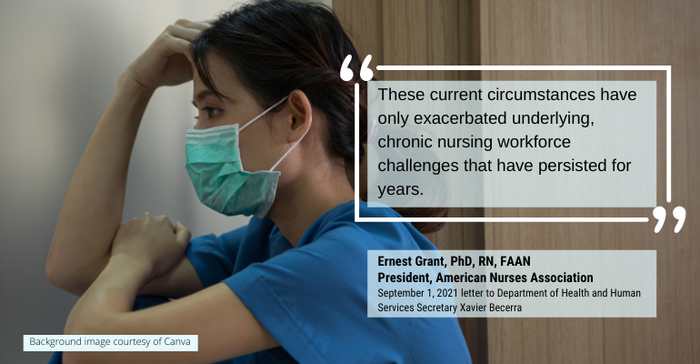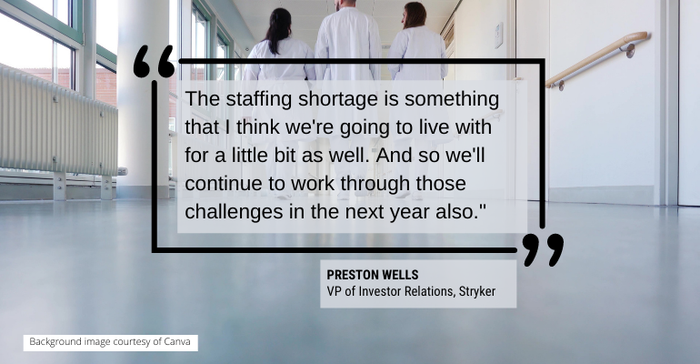Rising COVID hospitalizations and hospital staffing shortages are once again expected to force elective procedures to the back burner.
January 4, 2022

Between hospital staffing shortages and rising COVID hospitalizations from the Omicron variant, something has to give. Unfortunately for a lot of patients and medtech companies, that "something" is elective surgery.
"With hospitals short-staffed and COVID hospitalizations increasing, there just isn't enough availability of beds or providers to handle all surgical patients," medtech analysts at BTIG wrote in a January 3 report. "In short, the areas that are being hardest hit are the usual suspects, orthopedics and elective general surgery, while cardiac surgery and non-elective general surgery appear to be least impacted."
BTIG's team of medtech analysts (Ryan Zimmerman, Marie Thibault, Sam Eiber, and Phillip Dantoin) surveyed 51 hospital executives late last week from 23 states representing facilities ranging in size from 50 to 1,100 beds, for an average facility size of 377 beds. The analysts reported that most executives (about 78% of survey respondents) said the current COVID surge is impacting other parts of the hospital, with elective surgeries being canceled, preventive care delayed, and diagnostics and imaging procedures also postponed.
The analysts said that while the situation is very fluid, hospital admins, on average, are expecting a 3-4 week period of elective surgical impact before resuming at higher levels. Still, 15 of the surveyed administrators expect no impact to surgery from the current COVID surge.
Not surprising, the survey found that orthopedics procedures are most impacted, while cardiac surgery is least impacted. The analysts also found through the survey that outpatient surgery, for the most part, is being performed without disruptions, delays, or cancellations, according to 73% of the respondents. As for diagnostic screening procedures, gastroenterology suites appear to be most impacted, with imaging the least impacted.
Hospital staffing shortages will be a lingering concern
As MD+DI previously reported, hospital staffing shortages has become a major problem for much of the medtech industry. The BTIG analysts reported that while the COVID spike may eventually flatten, the lack of personnel may be a lingering concern this year. Their survey found that compared to a year ago, on average, about 16% of nurses and 12% of allied health professionals have left the respondents' respective facilities. The report also notes that temporary staffing challenges due to COVID exposure or other reasons have resulted in 11% and 10% declines from a year ago in nursing and allied health professionals, respectively.
According to a letter the American Nurses Association (ANA) sent to the Department of Health and Human Services in September, nursing shortages are being reported all over the country. The letter points to some depressing stats: Mississippi has seen a decrease of 2,000 nurses since the beginning of 2021; hospitals in Tennessee are operating with 1,000 fewer staff than at the beginning of the pandemic, prompting the state to call on its National Guard for reinforcements; Texas is recruiting 2,500 nurses from outside the state, a number that is expected to fall short of demand; Louisiana had more than 6,000 unfilled nursing positions open across the state even before the Delta variant created a surge in COVID-19 cases (the ANA also noted that Louisiana’s hospital staffing shortage may be even more severe in the aftermath of Hurricane Ida); and Nebraska has gone so far as to recruit unvaccinated nurses to address hospital staffing shortages in the state.

These external challenges present a double whammy for companies like Stryker, as it was in the third quarter when hospitals across the country were battling the Delta variant.

"During the quarter, significant spikes of the COVID-19 Delta variant drove increased infections and hospitalizations that require higher hospital bed utilization, which ultimately led to the deferral of elective procedures," said Preston Wells, vice president of investor relations at Stryker, during the company's third-quarter earnings call. "In addition to increased hospitalization, hospital staffing shortages also pressured procedural volumes throughout the quarter. This primarily impacted our implant-related businesses including hips, knees, and spine, which can be, in many cases, deferred for a period of time. However, the disease states that we treat are degenerative, and the patients that defer their procedures will eventually return to have those procedures completed."
About the Author(s)
You May Also Like




